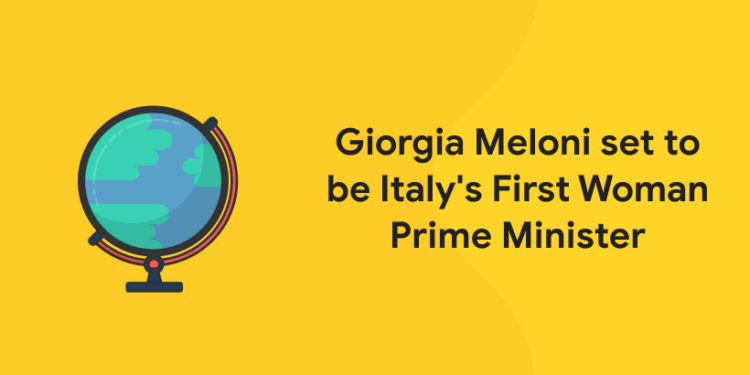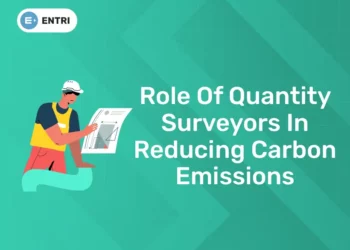Table of Contents
Giorgia Meloni achieved a massive victory in the Italian election held on Sunday (September 25th, 2022) and is now positioned to lead the most right-wing government since World War II as the nation’s first female prime minister.
According to predictions made by RAI, the public broadcaster, her alliance, which also included Matteo Salvini’s League and Silvio Berlusconi’s Forza Italia, received roughly 43% of the vote. That would give the group at least 114 seats in the Senate, where a majority of 104 votes is needed.
After leading the opposition to Mario Draghi’s technocratic rule, which stabilized the nation over the previous 18 months following the horror of the pandemic, Meloni rose to prominence in politics. The charming 45-year-old, however, has little experience in leadership, and she would assume government at a dangerous time for her nation.
The energy shortages brought on by Russia’s invasion of Ukraine will fuel runaway inflation and threaten GDP, putting the next Italian administration in the middle of a number of overlapping problems. The yield on Italy’s 10-year bonds has increased from less than 1% in December to more than 4.3% as a result of the blow to Italy’s budget and the possibility of future interest rate increases from the European Central Bank.
Meloni told supporters in the wee hours of Monday in a sober speech at a hotel in the downtown of Rome, “We haven’t arrived. “This is a starting point. And we’ll have to prove our worth tomorrow.
During Asian trading hours, traders ignored the outcome as they concentrated on the falling value of the pound. Sterling experienced its largest intraday slump versus the euro since the days following the 2016 Brexit referendum, falling as much as 3.7%.
President Sergio Mattarella will speak with party leaders following the announcement of the final results before virtually definitely appointing Meloni to form the new cabinet. Still, the process can take many weeks. On October 13, the newly constituted, 200 senatorial and 400 lower house legislators will convene for the first time.
Meloni began her political career in the 1990s as a far-right activist, and her campaigning is now characterized by vehement criticism of the European Union, immigrants, and LGBTQ communities. She has, however, also made an effort to reassure voters and investors by promising to bring Italy’s enormous debt under control and to defend Ukraine and its allies without hesitation.
Geoffrey Yu, a senior FX analyst at Bank of New York Mellon in London, said that the concern is if they would depart from Draghi’s reform agenda, which will have an effect on whether money will continue to flow from the EU.
About 66 billion euros have been spent by Draghi to assist individuals and businesses, but he has resisted political pressure to increase the budget deficit. That might be one of the first problems a Meloni government needs to deal with. The right-wing alliance has also rejected updating the antiquated tax code and liberalizing the marketplace, two crucial measures Draghi promised to make in order to be eligible for EU funding.
The Brothers of Italy, Meloni’s band, have had a stratospheric rise as a result. Compared to 4% in the 2018 election, the party received nearly 25% of the vote this time.
Attempt Free General Knowledge Mock test! Download Entri App!
Meloni’s primary rival in the race, Enrico Letta’s Democratic Party, finished in second with 19% of the vote and will now head the opposition. A significant force in the opposition is likely to be Giuseppe Conte’s anti-establishment Five Star Movement, which saw a late surge to approximately 16% of the vote.
Meloni will be closely monitoring her coalition partner Salvini as she prepares to perhaps take office around the end of next month. Salvini’s party underperformed with about 9% of the vote. Salvini believed he would succeed Matteo Renzi as Italy’s prime minister in 2019, when his party topped the polls with 34%, and he has only recently come to terms with the fact that he will now have to serve as the Brothers of Italy’s deputy.
Politics expert Giorgia Serughetti of Milan University predicted that internal disputes will soon put the government to the test. “It was unexpected that the League received such poor support. We should prepare for a Meloni-led administration that will likely experience significant internal unrest.
Salvini has adopted a more confrontational stance throughout the campaign in regards to boosting borrowing to assist Italians in getting through the energy crisis, and he has questioned the efficacy of sanctions against Russia.
Meloni paid homage to her team while thanking him and Berlusconi for their support and the manner in which they had campaigned during her election night address. She quoted St. Francis as saying, “You start by doing what is necessary and then you do what is possible,” she said, quoting St Francis. “And you’ll end up achieving the impossible.”
Prepare for General Knowledge Exam! Download Entri App!
Who is Giorgia Meloni?
Meloni is a native Roman who was primarily raised by her mother; the lack of a strong father figure has influenced her thoughts on rejecting same-sex parenthood. Meloni was raised in Rome’s Garbatella, a trendy, working-class neighborhood with a strong left-wing past, and has been a devoted national conservative ever since.
Meloni, then just 15 years old, joined the now-defunct nationalist Social Italian Movement (Movimento Sociale Italiano, MSI) in 1992. Through years of passionate action, she eventually carved out a place for herself in the Italian political scene. The MSI’s indirect offspring, Brothers of Italy, was established as a political party in 2013. Meloni moved swiftly through the party’s ranks to become its president, turning Brothers of Italy from a marginal power sandwiched between the larger right-wing coalition parties into the bloc’s largest force.
She frequently hears criticism that she lacks expertise leading a once-small political party. She pointed to her position as the youth minister in Berlusconi’s cabinet from 2008 to 2011, saying, “Many of us [in Brothers of Italy] have already served in government; I was the youngest minister in the history of the Italian Republic when I served in the last center-right government.”
She continued, “We have an experienced and trustworthy ruling class,”
Meloni’s detractors also charge her party with harboring fascist sympathizers, a charge she refutes.
Professor Andrea Mammone of La Sapienza, a renowned historian and authority on fascist politics, characterized her party as one that was “in keeping with the neo-fascist tradition.”
Most recently, the Brothers of Italy suspended a candidate from Sicily due to his praise of Adolf Hitler on social media.
She declared, “[Ours] is the party of Italian Conservatives. We are a contemporary governmental right wing that controls 15 out of 20 regions and hundreds of municipalities in Italy today.
The prime ministers of Poland and the Czech Republic are also members of the European Conservative Party (ECR), which has strong ties to the British Conservatives, the American Republicans, and the Israeli Likud, she continued.
In order to revitalize Italy’s economy, Meloni’s ideas combine identity politics of religiously informed patriotism with ostensibly business-friendly economic principles.
Meloni also campaigns against some of the dangers she believes are posing a threat to Western civilization, including extreme Islamism, “LGBT lobbies,” and “gender ideology” (the existence of which her detractors fundamentally dispute).
Prepare for General Knowledge Exam! Download Entri App!
Where does Meloni stand on Europe?
Meloni and her coalition colleague, Salvini of the Northern League, are frequently described as rebellious Europeans.
In addition to opposing the EU’s position on immigration, they have criticized the euro, supported the UK’s pro-Brexit Tories, marched against “Brussels bureaucrats,” and promoted immigration policies, most recently a naval “block” in the Mediterranean Sea.
According to La Repubblica on Thursday, Letta, the Democratic Party’s center-left candidate, claimed that Meloni was a part of the “first serious attempt to break apart the EU.”
Giorgia Meloni is a Euroskeptic, then?
She stated, “I read experts trying to describe me in so many ways. They hardly ever accept my self- and My party
She favors the term “Eurorealist,” which is frequently used by European Conservatives, and defends the idea of European integration, but not in its broadest sense.
Meloni said, “We do not recognize ourselves in the idea of’more Europe’ at any costs and on all issues. “This has so far led to increased centralization, increased bureaucracy, and decreased subsidiarity, which is otherwise a basic EU principle that we want to maintain,” said the author.
Although extensively used by political scientists, the term “euroscepticism” itself is contentious; some historians believe it creates an untrue and artificial division between proponents and opponents of European integration.
Some people prefer to discuss several “models” of Europeanism that occasionally diverge from what the EU is promoting.
Meloni doesn’t profess to “oppose” Europe; instead, she presents an integration model that might or might not be favorably received in Brussels.
According to her, “If we had an EU more like the one we imagine, we would have developed a more effective defense policy, invested in energy security, and maintained short value chains to avoid dependence on third-party – frequently unreliable – countries for gas, raw materials, commodities, chips, and other goods.”
Thus, might the “Europe of nations” paradigm that the European right has promoted since the 1950s and 1960s be represented by Meloni’s concept of integration?
We want a stronger, more stable Europe, she continued.
Attempt Free General Knowledge Mock test! Download Entri App!
Putin would be happy if Meloni wins Italy’s election, says Letta
Whether Meloni can be classified as a “Eurosceptic” or not, the question of whether her view of Europe will put her at odds with Brussels remains. And what position, if any, will Italy hold within the Union?
Mario Draghi, the outgoing prime minister, is regarded as a favorite of the EU. His policies have helped Italy be named “Country of the Year” by The Economist, and his visions have been closely matched with those of Brussels.
Meloni sees Brussels differently. For instance, she is against Draghi’s Resilience and Recovery Plan, which would pour €190 billion in EU funding into the battered Italian economy.
Without causing rifts, but with the same steadfastness with which the Germans and French defend their own, Meloni said, “We want to defend Italy’s national interest.”
Meloni advocates for European-wide cooperation on the issue of the energy crisis, but he also believes it is only natural for country states to defend their own interests.
She also has faith in the ability of the Italian economy to navigate the post-COVID-19 situation.
Although we have a large public debt, she said, “it is fully manageable given the strength of our economy.”
Some observers worry that Italy may lose its allies due to its proposed public spending plans and its braggadocio attitude against the Brussels establishment. Others, however, believe that Italy’s foreign policy, particularly with regard to Russia, will generally avoid major disruption under her leadership.
Meloni is certain that she can make Italy a strong leader and player on the European political scene, despite the pessimism and skepticism that some may be feeling in Brussels.
She said, “We want to give Italy its proper place in this Europe. We are one of the founding countries, having the second-largest industrial sector in Europe and the third-largest economy in Europe. We have also consistently contributed to the budget of the EU in a positive manner.














